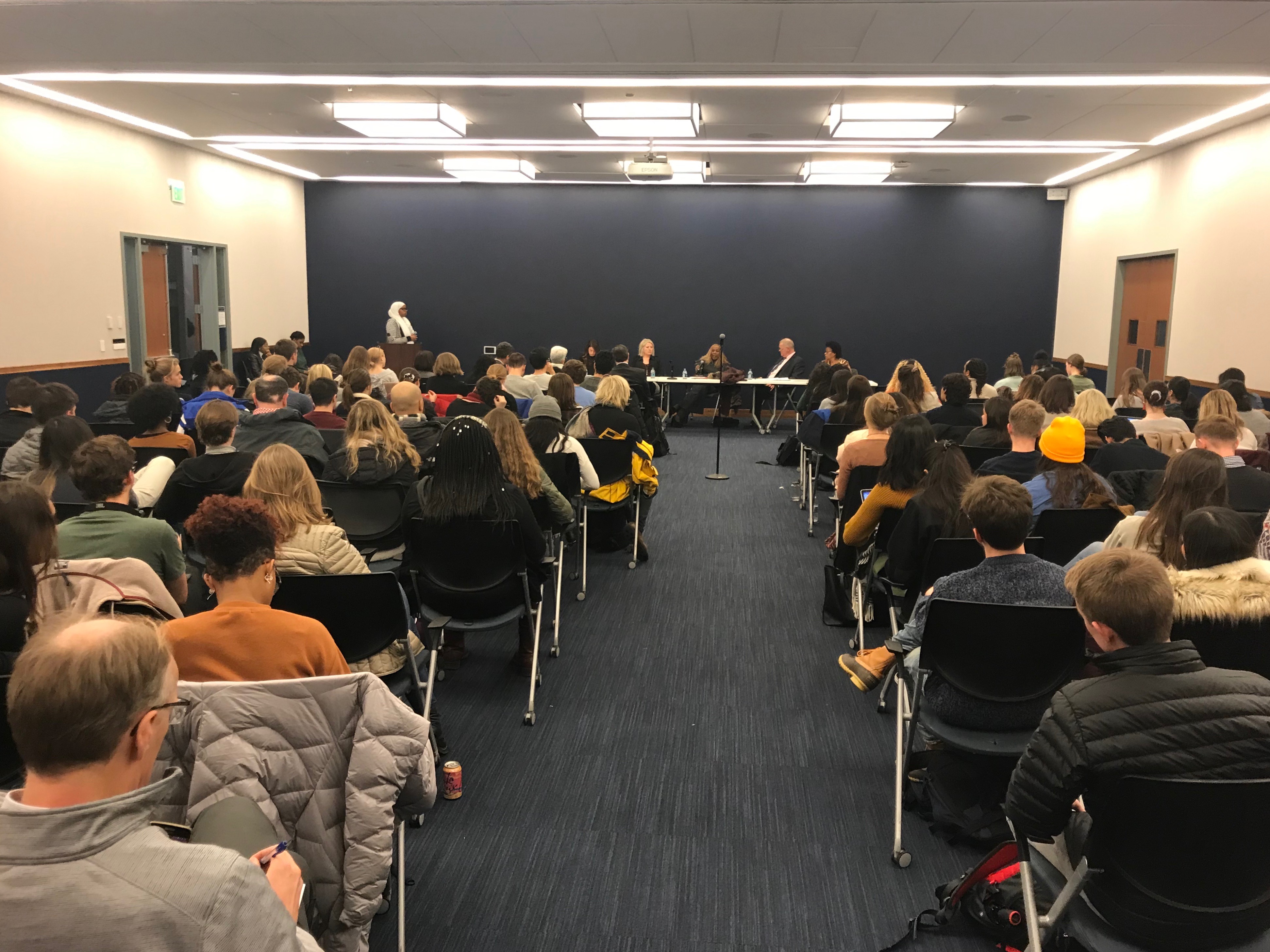Students Taking Action Against Interpersonal Violence (STAIV) held a town hall on Jan. 15 to discuss the Department of Education’s proposed changes to Title IX regulations and the university’s approach to preventing interpersonal violence overall. STAIV co-hosted the event with the Black Student Alliance (BSA) in the Healey Family Student Center Social Room. The event included a STAIV-facilitated dialogue followed by a question and answer session with administrators. Over 100 people attended.
Vice President for Student Affairs Todd Olson, Vice President for Institutional Diversity and Equity Rosemary Kilkenny, Interim Title IX Coordinator Samantha Berner, Associate Director of Health Education Services Jen Schweer, and Director of the Office of Student Conduct Judy Johnson responded to questions from STAIV facilitators, club representatives, and community members about how the university addresses interpersonal violence.
In response to a question about the timeline for hiring a full-time Title IX coordinator, Kilkenny said that the search has been narrowed to two candidates. “It would be great to have someone in place by spring,” Kilkenny said. “We are very close, and I am very optimistic.”
The university has not had a full-time Title IX coordinator since June 2018.
Additionally, Sergeant Sarah Halpren-Ruder, GUPD’s Sexual Assault Response Team (SART) coordinator, committed to an increase in training for the entire department. Mandatory officer training has been quadrupled to 8 hours, and SART officers could receive as many of 80 hours of sexual assault response training.
After acknowledging commitments by GUPD and the administration to meet students’ needs, STAIV expressed concerns about a lack of resources available to Health Education and counseling services to uphold those commitments.
“I’d like to see more active efforts in transparency and prioritization of funding these resources that do so much for University students,” Larry Huang (COL ’19), a member of STAIV, said.
After the facilitated portion, Jazmin Pruitt (COL ’19), another STAIV facilitator, invited representatives from groups like GU Women of Color, BSA, and GU Queer People of Color to ask questions. “We want to ensure that communities left out of these conversations are included,” Pruitt said.
These groups raised questions about the specific needs of students of color, LGBTQ students, and other marginalized populations. Kilkenny acknowledged the need for more outreach to these groups on-campus. “We have to be a lot more intentional and a lot more aggressive,” Kilkenny said.
Olson said that the university is in the midst of its efforts to make more resources available to marginalized and minority students. “We have worked to really ramp up the staffing in Health Ed because of the critical work they do. We’ve worked to increase staffing in our counselling center,” Olson said. “We recognize this is unfinished work.”
When the question and answer session was opened up to all students, those present raised their concerns about the reduced responsibility of universities to investigate cases under the proposed Title IX regulations.
Kilkenny promised that the university would continue to meet the standards set by the existing regulations. “We have absolutely no intention of retreating from the commitments we have made,” she said.
Huang was pleased that the administration made this and other commitments, but hopes its efforts will not end there. “We want to stress that this is really the beginning of the conversation,” he said.
The administration is currently drafting its official comment on the Title IX changes first proposed by the Department of Education in November. According to Olson, Georgetown plans to denounce all major proposed changes.
“We believe the proposed regulations will deter reporting,” Olson said. “They’ll allow misconduct to go unaddressed, and they’ll make students feel less safe and be less safe.”
When the administration releases the draft of its comment—Kilkenny estimated this will be in the coming week—students will have a chance to offer feedback on the university’s draft before the federal deadline for comments a few days later on Jan. 28.
Maya Moretta (COL ’21), a STAIV member who facilitated the event, was frustrated with the short period to respond. “As the timeline stands now, that would give a very small window for students to be able to respond to your comment,” Moretta said.
Saham Ali (COL ’21), a STAIV facilitator, asked for continued dialogue at the town hall’s conclusion.
“We also want to hold you all accountable,” Ali said, “To update the student body about the steps that you take toward issues of sexual assault on this campus.”






